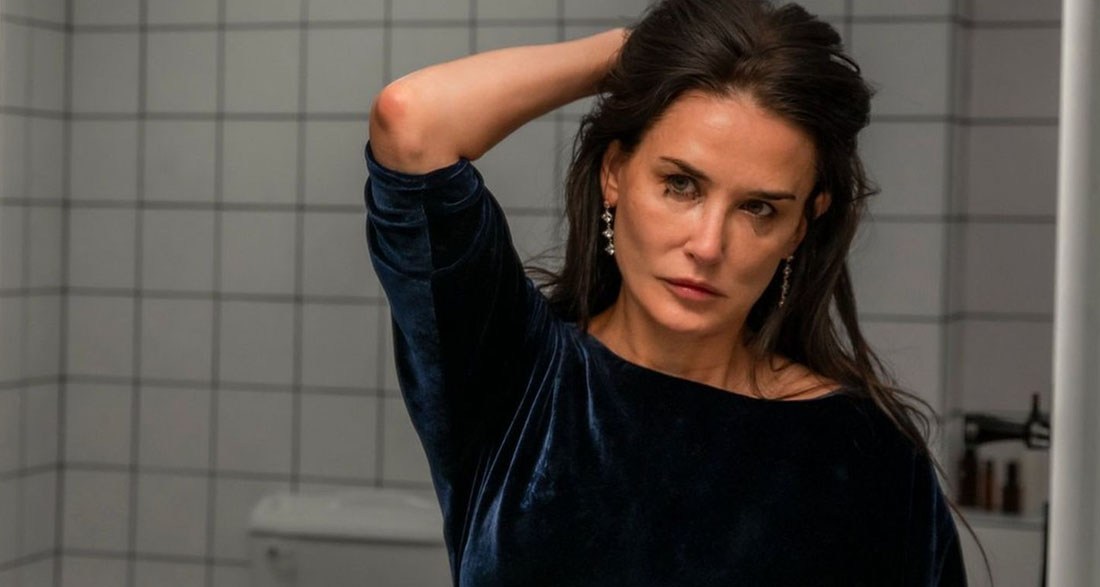Demi Moore is making a radical comeback with The Substance. And for the first time, she has a real shot at an Oscar.
At 62, Demi Moore has finally given up the pursuit of perfection. And at last, she is receiving the recognition that has long been denied to her. For her role in the horror film The Substance, she won her first Golden Globe, received her first Oscar nomination, the SAG Award—and maybe, on March 3rd, even her first Academy Award.
Fittingly, the film also revolves around the relentless pursuit of perfection—external, youthful perfection, which every woman, not just in Hollywood, is subjected to. As Elizabeth Sparkle, Moore fights against aging under the direction of Coralie Fargeat, 48, as it threatens to push her out of her career. What interested her most about the role were “the circumstances of a woman in the entertainment industry, confronted with rejection and deep despair. Everything that seemed to matter in her life is being ripped away,” she told The Guardian in 2024. The parallels to her own career are obvious.
Admired for Her Beauty, Mocked for Her Ambition
Demi Moore is a living example of the sexism in Hollywood over the past decades. In the 1980s and 1990s, she became a superstar with films like Ghost, Indecent Proposal, and A Few Good Men—admired for her beauty, mocked for her ambition. In A Few Good Men and G.I. Jane, she played women fighting against male power structures—and had to endure comments from producers such as, “If Tom [Cruise, her co-star in A Few Good Men] and Demi aren’t sleeping together, why is Demi even a woman?”
But sexism wasn’t just something she faced on-screen. In real life, Moore also had to battle Hollywood’s double standards. Her pregnant body on the cover of Vanity Fair in 1991 was labeled “pornographic” and caused a scandal. When she negotiated a $12 million salary for Striptease—then the highest ever for an actress—she was met with ridicule. Meanwhile, her then-husband Bruce Willis, 69, earned nearly twice as much for Die Hard, yet she had to endure headlines like “Gimme Moore.”
But Moore had already survived worse. In her 2019 memoir Inside Out, she described her dark childhood with a suicidal mother, a violent father, sexual abuse by a “family friend,” as well as struggles with alcohol, cocaine addiction, and eating disorders. She was sober for 20 years—until Ashton Kutcher, 47, entered her life, questioned the “concept” of alcoholism, and encouraged her to drink again. Their marriage—also plagued by tabloid headlines about their 16-year age gap—ended after six years in yet another low point for Moore. Kutcher had cheated on and humiliated her, and she had once again “lost herself,” as she described in an interview with People. And once more, she had to fight—against public perception, against her addictions, against her own body.
Finally Free from Beauty
Amid this low point, the script for The Substance arrived. You can see this battle in her performance. With this body horror film, she finally frees herself from the pressure of having to be beautiful. Her character ages faster and more grotesquely, while her younger alter ego, played by Margaret Qualley, 30, embodies radiant youth. It was liberating, Moore told The Guardian: “I’m degraded throughout the film, and I knew from the beginning that I wouldn’t be shown in the most glamorous way—without soft lighting, quite the opposite. But there was something freeing about that.”
After decades of being expected to look perfect, Demi Moore is showing herself unfiltered for the first time—and is being celebrated for it. In January 2025, she accepted the Golden Globe for Best Actress in a Musical or Comedy (despite the film’s brutal satire) visibly overwhelmed. In her speech, she recalled how a producer once dismissively called her a “popcorn actress,” and how she had long believed that she wouldn’t achieve more than that. Thirty years later, she has proven him—and most importantly, herself—wrong.






